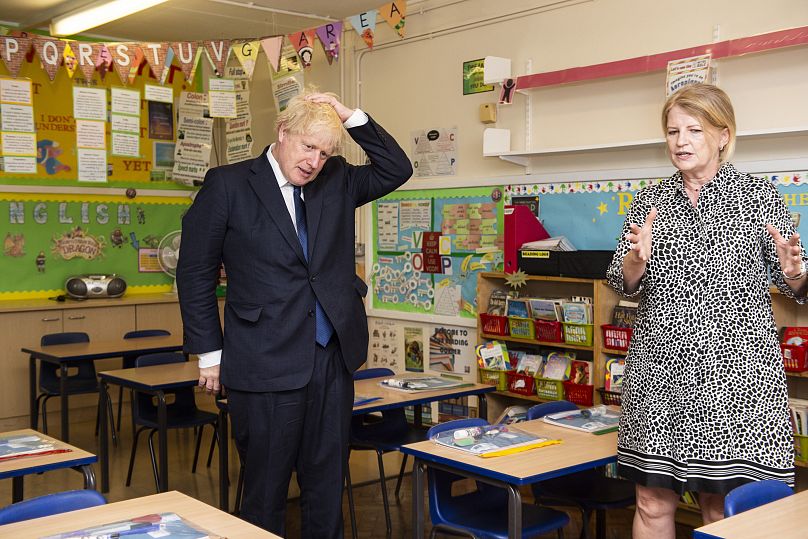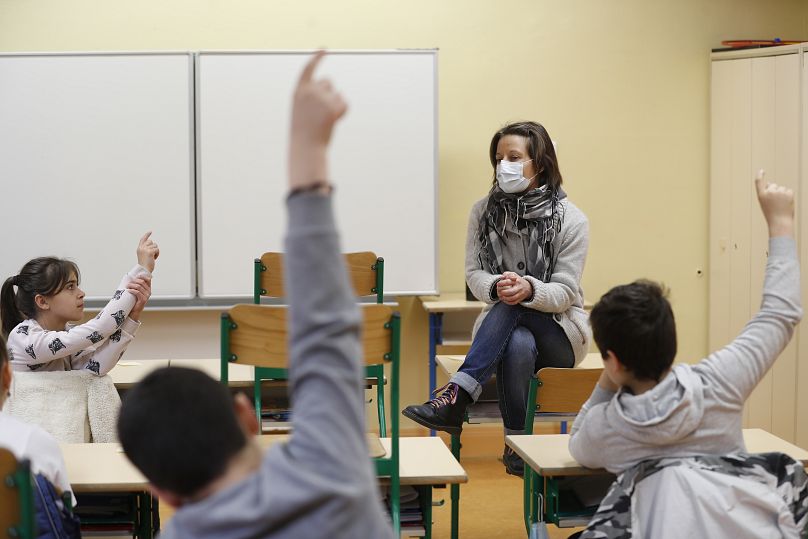From primary schools in France where there is "almost never a substitute" when teachers are off, to a secondary school teacher in London who has never felt more stressed, here's how the coronavirus pandemic is affecting Europe's educators.
With Europe in the throes of a second wave of the coronavirus, teachers have told Euronews they are among those bearing the brunt of the crisis and for little or no recognition.
 ADVERTISEMENT
ADVERTISEMENT
 ADVERTISEMENT
ADVERTISEMENT
The safety of both themselves and their students and declining mental health are top of the list when it comes to their concerns.
A majority (77%) of UK teachers in a recent survey reported their current levels of stress and anxiety as high or very high.
During the first round of national lockdowns, schools closed their doors in most countries on the continent and teachers had to produce resources and manage online learning.
This time around, as cases of the virus soared, many counties have returned to lockdowns but have chosen to leave education institutions open.
While there are undeniable benefits of sending children to school that go beyond their education, what price are teachers paying for the decision?
England: 'Immense pressure is leaving teachers stressed, exhausted and worn out'
The survey, which saw responses gathered from 7,440 members of NASUWT, one of the largest trade unions for the profession in the UK, showed the stark reality of what many teachers have faced this year.
The union highlighted the fact that more and more teachers were absent from work because of illness or the need to self-isolate.
“Dedicated and talented teachers are also reporting mental health problems and that continuing to work under immense pressure is leaving them stressed, exhausted and worn out," said NASUWT General Secretary Dr Patrick Roach.
A secondary school English teacher from London, who wanted to remain anonymous, echoed this feeling to Euronews, saying the pandemic had created "the most stressful environment I've ever worked in".
She described how there were several members of staff at her school who had been put on leave due to stress, adding she too had considered requesting this couple of weeks ago, but that through the support of her school she avoided doing so.
"Every member of staff that I've spoken to is experiencing a lot of anxiety. And comparing it to before COVID, I didn't feel really anxious then," she said.
The English teacher blames the elevated stress levels on the worry surrounding increasing infections and teachers being hyper-aware of how their actions could affect the wellbeing of the children they teach, their students' families and their own loved ones.
"When there are announcements about cases rising, there is there's a lot of anxiety for you and the role you could be playing in actually spreading the virus," she explained.
She said she did not feel supported by the government in Westminster, which was "in large part because there seems to be no communication between the government and the sector".
Roach doubled down on this claim, saying: “The government has not done enough to support teachers in meeting the challenges of providing education to children and young people in these unprecedented circumstances."
The UK's Department for Education told Euronews it was “enormously grateful to teachers and other school staff for the resilience and commitment they have shown in supporting children during this challenging time".
As part of "consistent action to address teacher workload and wellbeing" it said it has "invested millions in mental health charities to support teachers" that included "a new £8 million training programme run by experts to tackle the impact of coronavirus on pupils, parents and staff”.
The British secondary school teacher says that while a lot of attention has "rightly" been given to the NHS for their efforts in combatting the virus, she says teachers' hard work hasn't been acknowledged.
"The teaching profession is often vilified and some people don't like teachers, which I think was made a bit more apparent during lockdown," she explained. "We had the 'clap for carers' and NHS workers getting discounts, but without the education service the country literally ground to a halt."
Scotland: 'Schools just need more staff'
A deputy headteacher at an Edinburgh primary school told Euronews since classes went back in August resources had been spread thin.
"Since we've been back at school, I'd describe things as being really tight in terms of staffing and covering things with the restrictions," she said, adding her school had only received one extra teacher for six weeks and called on the government to do more.
Scotland, similar to England, uses a "bubble" system to restrict the spread of the virus, which sees each class considered as a unit that must be kept separate from other groups of children and staff, who are not supposed to be with more than two different bubbles a day.
In her school two teachers have been signed off until Christmas with stress — this is far from the norm at her school.
The deputy does not believe all students need to be in the classroom five days a week, saying she felt like the school was being used as childcare and students were "not there for an educational purpose".
"Really what we need is fewer children in the room, as 33 kids in a room is a lot of kids, and makes social distancing impossible," she argued.
Euronews contacted Education Scotland for comment but had not received a response at the time of publication.
France: Teachers are not being replaced when they’re off
Staffing is also a key concern for French educators, who are suffering from a smaller workforce because of teachers being identified as positive/contact cases or being considered vulnerable people, Guislaine David, co-secretary general of the SNUipp-FSU union, told Euronews.
"There is almost never a substitute teacher available," a primary school teacher in Lyon told Euronews. "When a colleague is absent, the students are divided among the classes of the other teachers, leading to even more overcrowded classrooms. Sometimes we get five or six students in addition to our own."
She says that the health crisis has highlighted the dysfunctions in the national education system, namely the lack of substitute teachers, overcrowded classes and the increasing administrative burden on educators.
Physical education teacher Lisa at Paris' François-Truffaut College said when teachers were absent her school relied on other educators to volunteer to replace them and where that wasn't possible, students simply didn't have the lesson.
David called on France's education minister to recruit more people to replace sick teachers and reduce the number of people in classrooms.
Lisa said that the measures that had been announced since France's second national lockdown took effect in October were stricter, but many schools didn't have the means to enforce them.
"In our establishment, we don't have enough money to be able to clean several times a day and each student must have a mask that they should change every four hours but many don't wash or swap their mask at all during the week, so in terms of security, well it's zero," she said.
Her school is considered a "priority education establishment in a violent city zone" and so she said many students simply can't afford masks in many cases.
The Lyon teacher said that the atmosphere in her school was "sad" as teachers ate alone in their classrooms, adding that it wasn't the need to follow COVID-19 measures in itself that "weighs heavy, but above all the contradictory orders and counter-orders that are constantly imposed on us."
David said that current protocol doesn't allow for social distancing among students and saw them mixing during the collective breaks, like in the school canteen.
"We think that there is a real risk of virus spread because of schools. That is why we ask the national education minister to adopt stricter protocols to keep schools open," she added.
Euronews contacted the Ministry of Education in France who said that 6,000 additional supply teachers have been recruited at primary level and 8,000 at secondary level.
Across primary and secondary schools in the country, 62,000 supply teacher positions are planned for the school year, according to the ministry.
Every weekday at 1900 CET, Uncovering Europe brings you a European story that goes beyond the headlines. Download the Euronews app to get an alert for this and other breaking news. It's available on Apple and Android devices.












